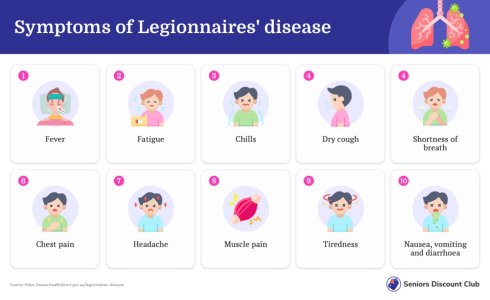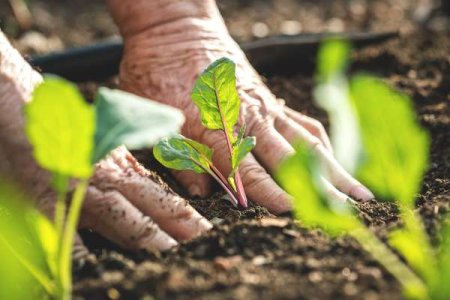Attention gardeners! Avoid contracting Legionnaires' disease with this vital advice from health authorities
Spring is officially in the air, and many of us are taking advantage of the sunshine and getting our green thumbs out to potter away in our gardens. However, did you know that potting mix, mulch and compost can carry serious risks?
New South Wales Health Executive Director Dr Jeremy McAnulty has warned avid gardeners about the potentially devastating consequences of contact with Legionella bacteria, which causes Legionnaires' disease.
The bacteria causes lung infection if inhaled and can multiply in bagged potting mix. Dr McAnulty has urged gardeners to read and follow the manufacturer's warnings when handling potting mix, mulch and compost.
‘Before opening the bag, put on a mask and gloves so you don't breathe in the dust or get it on your hands. Wetting the potting mix, mulch, or compost can reduce the dust blowing up into the air,’ Dr McAnulty said.
‘Even if you've been wearing gloves, make sure to wash your hands thoroughly with soap before eating or drinking as the bacteria could still be there,’ Dr McAnulty added.
There have been 54 cases of Legionnaires' disease reported in the state this year alone, while 132 cases were reported last year.
According to Health Direct, Legionnaires’ disease is usually not spread from person to person. However, it is very important to contact a doctor if you suspect you’ve been exposed to the bacteria.
While some people with the disease don’t have symptoms, some will likely feel unwell between two and 10 days of exposure. Symptoms could manifest around five to six days. They would be similar to those of flu:

Most cases of Legionnaires' disease are caused by the bacteria in large buildings' air conditioning cooling systems, and the strain found in the potting mix is a different strain of the same bacteria.
Smokers, people with chronic illness (heart disease, lung disease, diabetes, kidney disease, cancer), chronic immune suppression (if you take steroid medicines for a health condition), and people over 50 have an increased risk of contracting the disease.
If you believe you have been affected, seek medical help immediately and inform your doctor of any recent contact with soil products.
Legionnaires' disease can usually be cured with antibiotics. However, it may require hospital care and be fatal in some people.

Members, keep your gardens safe with these essential tips from the health authorities.
What do you think of this story, members? Share your thoughts in the comments below!
New South Wales Health Executive Director Dr Jeremy McAnulty has warned avid gardeners about the potentially devastating consequences of contact with Legionella bacteria, which causes Legionnaires' disease.
The bacteria causes lung infection if inhaled and can multiply in bagged potting mix. Dr McAnulty has urged gardeners to read and follow the manufacturer's warnings when handling potting mix, mulch and compost.
‘Before opening the bag, put on a mask and gloves so you don't breathe in the dust or get it on your hands. Wetting the potting mix, mulch, or compost can reduce the dust blowing up into the air,’ Dr McAnulty said.
‘Even if you've been wearing gloves, make sure to wash your hands thoroughly with soap before eating or drinking as the bacteria could still be there,’ Dr McAnulty added.
There have been 54 cases of Legionnaires' disease reported in the state this year alone, while 132 cases were reported last year.
According to Health Direct, Legionnaires’ disease is usually not spread from person to person. However, it is very important to contact a doctor if you suspect you’ve been exposed to the bacteria.
While some people with the disease don’t have symptoms, some will likely feel unwell between two and 10 days of exposure. Symptoms could manifest around five to six days. They would be similar to those of flu:

Most cases of Legionnaires' disease are caused by the bacteria in large buildings' air conditioning cooling systems, and the strain found in the potting mix is a different strain of the same bacteria.
Smokers, people with chronic illness (heart disease, lung disease, diabetes, kidney disease, cancer), chronic immune suppression (if you take steroid medicines for a health condition), and people over 50 have an increased risk of contracting the disease.
If you believe you have been affected, seek medical help immediately and inform your doctor of any recent contact with soil products.
Legionnaires' disease can usually be cured with antibiotics. However, it may require hospital care and be fatal in some people.
Key Takeaways
- Health authorities urged gardeners to wear masks and gloves to avoid contracting Legionnaires' disease from potting mix, mulch, and compost.
- New South Wales Health reports 54 cases of Legionnaires' disease this year and 132 cases last year.
- The bacteria causing the disease can multiply in bagged potting mix and other soil products and can cause lung infections if dust from these products is inhaled.
- Symptoms of the disease include fever, chills, a cough, shortness of breath, aching muscles, headache, tiredness, loss of appetite and diarrhoea, and it can usually be cured by antibiotic treatment.
Members, keep your gardens safe with these essential tips from the health authorities.
What do you think of this story, members? Share your thoughts in the comments below!
Last edited:








